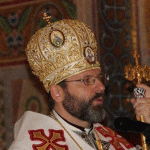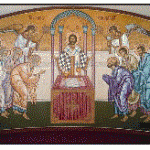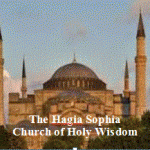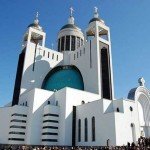 I rejoice that on Palm Sunday, on the day of the Entry of Jesus Christ into Jerusalem,
I rejoice that on Palm Sunday, on the day of the Entry of Jesus Christ into Jerusalem,
I again have the opportunity to address you.
“Be of good cheer; I have overcome the world.” (John 16: 33)
You always, and especially during this tough winter and an anxiety-ridden spring, have been in my prayers and my thoughts. I want to assure you that in all the difficult challenges, troubles and sorrows, the Church remains your steadfast Mother to whom you can always turn to in order to renew your strength, to find peace and hope.
This is a time of incredible challenges and simultaneously a time of deep conversion, a time of deliberation and change.
Together, we all are experiencing a complex, uncertain, while at the same time, an inspirational time. It is a time of incredible challenges and simultaneously a deep conversion, a time of deliberations and changes – a time, during which we can feel the presence of God in our history and His limitless love.
The festive entry of Christ to Jerusalem also took place at a difficult – perhaps even critical – time for the Old Testament people of God. The confused and disillusioned people of Israel waited for the Messiah — the One who would release them from the chains of slavery and despair. People expected change, the embodiment of their great wish – the coming of the king who would free Israel, reinstate peace and will rule all nations. The palm branches, held in their hands, symbolized the expected peace. They shouted “Hosanna!” which means “Save us!”
And Christ really did bring a victory – a victory much greater than the one which the Israelites expected: not a political victory, but a victory over death! Humankind met a real spring, an authentic renewal and liberation, whose only source is God the Lord. Only He through his strength can remove everything that has died and has petrified, and he offers a person a new life, new hope, and a new chance. This was foretold by the prophet Isaiah in these words: “Remember ye not the former things, neither consider the things of old. Behold, I will do a new thing; now it shall spring forth; shall ye not know it?” (Isaiah 43, 18-19).
The first who felt that novelty in Christ and who greeted Him, were the children! Young people are the ones who first feel the need for something better, because youthfulness is the spring of life. They do not only simply need what Christ grants, do not just expect change, but they accept it – they permit this novelty to sink inside of them, and yearn for the fullness of life. Youth starts moving towards God and is the one who is the first at realizing the fruits of God’s coming.
The Israeli people waited for the Messiah who would give them political freedom. We also sometimes expect that someone will build for us a better world, will do a miracle. This position is even evident in our prayers—we pay and wait that something will change without our participation.
Yet God needs our cooperation and gives us strength to realize the changes which we are requesting. Therefore we should realize that an authentic change is the result of the cooperation of the person with God. Let us remember how Christ taught his apostles: “I am the vine, ye are the branches: He that abideth in me, and I in him, the same bringeth forth much fruit: for without me you can do nothing” (John 15: 5)
A vivid example of the fact that Ukrainian youth deeply realized the mutual responsibility for themselves, for others, and for the entire creation became the events of the last months, which will enter history as the “revolution of dignity”.
It is my sincere belief that youth, believing youth, is a force that is capable of changing society, our people and their independent state. It becomes attractive, widening the wave of renewal, engages others to join them, disarms the opponents and numbs the lips of the falsehood speakers.
A vivid example of how deeply Ukrainian youth realized their responsibility for themselves, for others, and for all of creation can be found in the events of the last few months, which will enter history as the “revolution for dignity”. Our young people showed Europe and the whole world a new quality, demonstrated the authentic treatment of the values of freedom, dignity, and solidarity.
This was truly a grandiose change in the life of the Ukrainian people, which should become the outlook of further development. In no case, it cannot be relegated to heroic moments of the past, left behind. Maidan is a start, just as the festive entry of Christ into Jerusalem is the beginning of Holy Week, Christ’s passion, His voluntary humiliation and crucifixion on the cross. Today Jerusalem glorifies Jesus, although He will shine with authentic glory only when as victorious over sin and death He emerge Resurrected from a sealed grave. This cannot be stopped by anything or anybody: neither the stone which sealed the entrance to the grave, neither the weapons of the soldiers who guarded the grave, nor the culinary agreements of the godless rulers.
Unfortunately, a deep and fundamental change cannot be painless — a movement demands self-sacrifice. We also experienced that in the past months. The bright and pure sacrifice of the Heavenly Hundred… We deeply felt the commitment of the Maidan heroes, their deaths strongly impacted each one of us, and particularly those, who suffered the heavy loss of a family member, a friend or a colleague.
However, the definitive finale is not death, but victory – victory over evil, over death, over all that degrades dignity and takes away freedom. We clearly realize that the movement towards change leads through suffering to resurrection. Renewal – is a movement towards resurrection.
In his inaugural speech in 1978, Blessed Pope John Paul II, who will be canonized as a saint in two weeks, stated: “Do not be afraid! Open wide the doors for Christ. Open the borders, economic and political systems, cultures, civilizations, and the development of His rule of salvation.” His words are an appropriate call also to us. Let us not be afraid!
His successor on Peter’s throne, Pope Francis, also talks about courage and addresses youth: “Dare to swim against the tide. Dare to be authentically happy. Say “NO!” to ephemeral artificial culture which considers that you are not capable to take responsibility for yourself and to accept really great life challenges.” Maidan is our entry to Jerusalem. We saw glory, experienced suffering and comprehended the power of sacrifice.
Dearly Beloved in Christ – Dear Young Ukrainians!
The whole world saw that you are capable of swimming against the tide, take on responsibility and face challenges and danger eye to eye. You can change the world.
Maidan is our entry into Jerusalem. We saw glory, experienced suffering and comprehended the power of sacrifice. And we know that the trials will continue. But this is not all of it. Our revolution — spiritual, personal, national – is a process. Greatness is ahead of us and we can reach it only together with Christ. We will see victory in the greatness and dignity of the Resurrection, which is the greatest and a fundamental victory – over death and sin. Do not be afraid! Christ has already won: and our victory is in Him.
Blessings of the Lord upon you!
+ SVIATOSLAV
Issued in Kyiv
At the Patriarchal Cathedral of the Resurrection of Christ on April 1 of the Year of the Lord, 2014
We request all priests – pastors to read this epistle to the faithful
after every Divine Liturgy on Palm Sunday, April 13 of this year.






